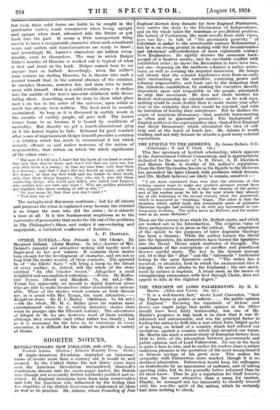SHORTER NOTICES.
REVOLUTIONARY NEW ENGLAND, 1691-1776. By James
Truslow Adams. (Boston : Atlantic Monthly Press, $5.00.)
If Anglo-American friendship depended on historians' views of events more than a century old, it would be well assured. In the United States the last thirty years have seen the American Revolution reconsidered, Bancroft's conclusions thrown into the waste-paper basket, the British case (though not necessarily British methods) justified and re- stated. In England historians have been more conservative and take the American side, influenced by the feeling that the stupidity of the British Government condemned its ideas as well as its practice. Mr. Adams, whose Founding of New
England showed deep distaste for New England -Pnritanism, here carries the story to the Declaration of Independence, and on the whole takes the American or pro-British position. His hatred of Puritanism, like most revolts from older views, goes too far to talk of "the pessimistic passivity" of Calvinism is Unfair to the seventeenth century Reformation ; but he is on strong ground in dealing with the inconsistencies and intolerant self-satisfaction of some eighteenth century New Englanders. He rightly stresses the economic back- ground of a frontier society, and its inevitable conflict- with established order ; be shows the Revolution to have been two, not one—deposing (in the northern colonies) a native aristo- cracy as well as severing the imperial connexion. He brings out clearly that the colonial legislatures were from an early date encroaching on the executive, exercising power and refusing responsibility, and leads one to the deduction that the American constitution; by making the executive directly dependent upon and responsible to the people, attempted to stop this. movement. He does not claim wisdom for British statesmanship in colonial matters ; as he well says, nothing could be more foolish than to make claims year after year in the certainty that they would be rejected, and with no intention of forcing their acceptance. But be dislikes the origin of American Democracy—that unstable town-meeting so often and so ignorantly praised. The background- 01 English politics is the representative idea ; that of New England was direct Democracy, which stimulated the idea of self- help and at the worst. of lynch law. Mr. Adams is worth reading, and not only because he attacks a good many colonial reputations


































 Previous page
Previous page